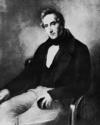- Manzoni, Alessandro
-
died May 22, 1873, MilanItalian novelist and poet.After spending much of his childhood in religious schools, Manzoni wrote a series of religious poems, Sacred Hymns (1815), and later two historical tragedies influenced by William Shakespeare, Il conte di Carmagnola (1820) and Adelchi (performed 1822). He is best known for the novel The Betrothed, 3 vol. (1827), a masterpiece of world literature and the most famous Italian novel of its century, in which, prompted by a patriotic urge to forge a language accessible to a wide readership, he employed a clear, expressive prose that became a model for many subsequent Italian writers. Manzoni's advocacy of a united Italy made him a hero of the Risorgimento; his death prompted Giuseppe Verdi's great Requiem.
 Alessandro Manzoni, oil painting by Francesco Hayez; in the Brera Gallery, Milan.AlinariArt Resource
Alessandro Manzoni, oil painting by Francesco Hayez; in the Brera Gallery, Milan.AlinariArt Resource* * *
▪ Italian authorborn March 7, 1785, Milandied May 22, 1873, MilanItalian poet and novelist whose novel I promessi sposi (The Betrothed, 1952) had immense patriotic appeal for Italians of the nationalistic Risorgimento period and is generally ranked among the masterpieces of world literature.After Manzoni's parents separated in 1792, he spent much of his childhood in religious schools. In 1805 he joined his mother and her lover in Paris, where he moved in radical circles and became a convert to Voltairian skepticism. His anticlerical poem “Il trionfo della libertà” demonstrates his independence of thought. When his mother's lover and his father died, the former left him a comfortable income, through his mother.In 1808 he married Henriette Blondel, a Calvinist, who soon converted to Roman Catholicism, and two years later Manzoni himself returned to Catholicism. Retiring to a quiet life in Milan and at his villa in Brusiglio, he wrote (1812–15) a series of religious poems, Inni sacri (1815; The Sacred Hymns), on the church feasts of Christmas, Good Friday, and Easter, and a hymn to Mary. The last, and perhaps the finest, of the series, “La pentecoste,” was published in 1822.During these years, Manzoni also produced the treatise Osservazioni sulla morale cattolica (1819; “Observations on Catholic Ethics”); an ode on the Piedmontese revolution of 1821, “Marzo 1821”; and two historical tragedies influenced by Shakespeare: Il conte di Carmagnola (1820), a romantic work depicting a 15th-century conflict between Venice and Milan; and Adelchi (performed 1822), a richly poetic drama about Charlemagne's overthrow of the Lombard kingdom and conquest of Italy. Another ode, written on the death of Napoleon in 1821, “Il cinque maggio” (1822; “The Napoleonic Ode”), was considered by Goethe, one of the first to translate it into German, as the greatest of many written to commemorate the event.Manzoni's masterpiece, I promessi sposi, 3 vol. (1825–27), is a novel set in early 17th-century Lombardy during the period of the Milanese insurrection, the Thirty Years' War, and the plague. It is a sympathetic portrayal of the struggle of two peasant lovers whose wish to marry is thwarted by a vicious local tyrant and the cowardice of their parish priest. A courageous friar takes up the lovers' cause and helps them through many adventures to safety and marriage. Manzoni's resigned tolerance of the evils of life and his concept of religion as the ultimate comfort and inspiration of humanity give the novel its moral dimension, while a pleasant vein of humour in the book contributes to the reader's enjoyment. The novel brought Manzoni immediate fame and praise from all quarters, in Italy and elsewhere.Prompted by the patriotic urge to forge a language that would be accessible to a wide readership rather than a narrow elite, Manzoni decided to write his novel in an idiom as close as possible to contemporary educated Florentine speech. The final edition of I promessi sposi (1840–42), rendered in clear, expressive prose purged of all antiquated rhetorical forms, reached exactly the sort of broad audience he had aimed at, and its prose became the model for many subsequent Italian writers.Manzoni's wife died in 1833; his second wife and most of his children also predeceased him. These calamities deepened rather than destroyed his faith. Revered by the men of his time, he was made a senator of Italy in 1860. A stroke followed the death of his oldest son in 1873, and he died that same year and was buried with a state funeral.* * *
Universalium. 2010.
